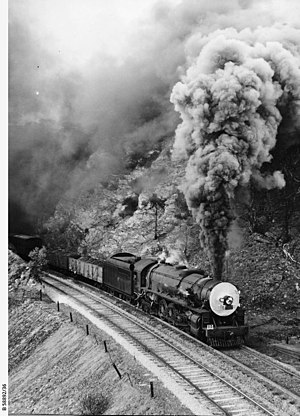South Australian Railways 500 class (steam)

502 at Eden Hills in August 1953
|
|||||||||||||||||||
|
|||||||||||||||||||
|
|||||||||||||||||||
|
|||||||||||||||||||
| Type and origin | |
|---|---|
| Power type | Steam |
| Designer | Fred Shea |
| Builder | Armstrong Whitworth |
| Serial number | 633-642 |
| Build date | 1926 |
| Total produced | 10 |
| Specifications | |
|---|---|
| Configuration |
4-8-2 (as built) 4-8-4 (after rebuilding) |
| Gauge | 5 ft 3 in (1,600 mm) |
| Driver dia. | 5 ft 3 in (1,600 mm) |
| Fuel type | Coal |
| Fuel capacity | 12 long tons 0 cwt (26,900 lb or 12.2 t) |
| Boiler pressure | 200 psi (1,379 kPa) |
| Cylinders | 2 |
| Cylinder size | 26 in × 28 in (660 mm × 711 mm) |
| Career | |
|---|---|
| Operators | South Australian Railways |
| Numbers | 500-509 |
| Withdrawn | 1955-1962 |
| Preserved | 504 |
| Scrapped | 1961-1965 |
| Disposition | 1 preserved, 9 scrapped |
The South Australian Railways 500 class was a class of 4-8-2 steam locomotives operated by the South Australian Railways. They were rebuilt as 4-8-4s.
The 500 class were part of larger order for 30 steam locomotives placed with Armstrong Whitworth, England, in 1924, as part of the rehabilitation of the state's rail system being overseen by Railways Commissioner William Webb. They replaced the Rx and S class locomotives, many dating back to 1894, that were still performing mainline duties, meaning that double and even triple heading was common. All ten 500-class locomotives arrived in Adelaide in 1926, and entered service on the Adelaide to Wolseley line as far as Tailem Bend. All were named after notable South Australians.
In May 1928, 506 was experimentally fitted with a booster, included in a newly created four wheel trailing truck. This American-inspired modification proved highly successful, increasing the locomotive's tractive effort from 51,000 pounds-force (230 kN) to 59,000 pounds-force (260 kN). This modification was subsequently fitted to the nine remaining locomotives, resulting in the class becoming the 4-8-4 class 500B.
Throughout the mid-1930s all but two of the locomotives in the class were semi-streamlined and had valances fitted. The first two 500-class locomotives were withdrawn from service in 1955 and the last was withdrawn in 1962.
504 is preserved as a static exhibit at the National Railway Museum, Port Adelaide.
...
Wikipedia
